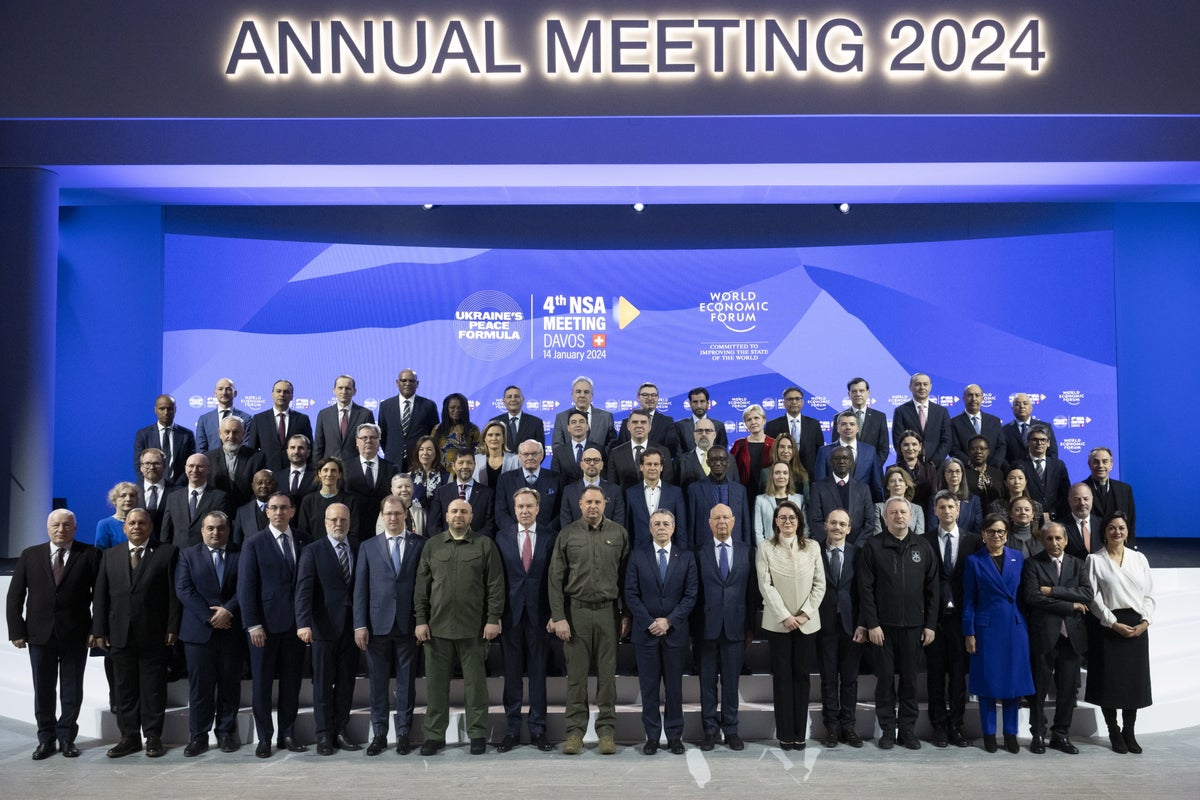
A high-level meeting to discuss peace in Ukraine ended without a significant resolution, as talks were held on the eve of the World Economic Forum in Davos with the second anniversary of Vladimir Putin’s invasion fast approaching.
Representatives of more than 83 countries were involved in the fourth and final such meeting of national security advisers, but little common ground was found towards ending a conflict that appears stuck in a grinding deadlock.
Ignazio Cassis, the foreign minister of host nation Switzerland, said the gathering helped clarify certain points for future discussions but that it was clear none of the warring parties were willing to make territorial concessions.
Both China and Russia itself were missing from the talks, and there were calls for Beijing to take part in any future discussions given its key role in supporting Mr Putin’s regime.
Ukraine had hoped to also reach an agreement on holding a leader-level meeting to take the peace talks forward and build backing for its 10-point peace plan, but no agreements were reached on Sunday.
The meeting’s attendance of 83 representatives, including 18 from Asian countries and 12 from Africa, made it significantly larger than the 65 that attended the last talks in Malta in October.
Andriy Yermak, chief of staff to Ukrainian president Volodymyr Zelensky, said Ukraine was not pressured by its allies into giving up its territory to Russia “which they know is not acceptable for us,” and it would never accept a “frozen conflict”.
Swiss President Viola Amherd (R) welcomes Chinese Prime Minister Li Qiang (L) and his delegation upon their arrival at Zurich Airport— (EPA)
The meeting was praised for the active participation of national security representatives from India, Brazil and Saudi Arabia, countries from the Global South who still have good diplomatic relations with Russia.
"Countries from the Global South are increasingly getting involved in our work. It shows understanding that this European conflict is in fact a challenge for all humanity," Mr Yermak wrote on Telegram.
Ukraine, with strong backing from its allies, has consistently said it will not give up until it has reclaimed every piece of territory that Russia has taken.
Mr Zelensky’s 10-point peace plan calls for the withdrawal of Russian troops, cessation of hostilities and the restoration of Ukraine‘s state borders with Russia. Kyiv has said it wants to return to 1991 borders, according to defence secretary Rustem Umerov, a goal that would include Crimea which was illegally annexed by Russia in 2014.
Russia, which was not invited to the meeting, has rejected these terms and said it is absurd to talk about peace without Moscow’s participation.
Mr Cassis defended the lack of Russian attendance, saying: “For now, Russia is not ready to take any step or make any concession.” He added that it was illusory to think that Russia would respond positively to an invitation and that this was not the goal of the Davos conference.
Ukraine’s (L-R) Justice Minister Denys Maliuska, First Deputy Prime Minister Yulia Svyrydenko, Head of the Office of the President Andriy Yermak, Defense Minister Rustem Umerov and Prosecutor General Andriy Kostin attend a press conference after the 4th meeting of the National Security Advisors (NSA) on the ‘Peace Formula’ for Ukraine, in Davos— (EPA)
The host nation’s diplomat acknowledged “many challenges” in the process and said negotiators were working to “modulate” the fine print of the peace formula to make it more workable with Russia.
Mr Yermak said on Sunday it was important that China was at the table when Kyiv convenes further meetings on its peace formula.
Chinese premier Li Qiang will lead the Chinese delegation at Davos amid suggestions that he could meet Mr Zelensky.
Mr Cassis acknowledged China’s role in mediation and said: “China plays a significant role. We must find ways to work with China on this.”
The meeting came ahead of the annual gathering of political and business leaders for the World Economic Forum in Davos on Monday evening where Mr Zelensky will try to revive support for Ukraine in its fight against Russia amid swelling geopolitical distractions in the Middle East.
Mr Zelensky is expected to hold bilateral meetings with a number of leaders in Davos and make a high-profile speech.
US national security adviser Jake Sullivan and secretary of state Antony Blinken are both expected to address the WEF, as concerns grow about maintaining Washington’s support for Ukraine during an election year.
This winter Putin has stepped up his missile and drone attacks in Ukraine, overstretching Kyiv’s air defence resources and leaving the country’s civilian infrastructure vulnerable to attack.
“The war is far from over and peace is still nowhere in sight,” the Swiss department of foreign affairs had said ahead of Sunday’s talks.







